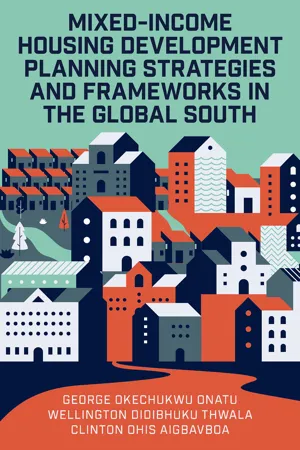
Mixed-Income Housing Development Planning Strategies and Frameworks in the Global South
- 312 pages
- English
- ePUB (mobile friendly)
- Available on iOS & Android
Mixed-Income Housing Development Planning Strategies and Frameworks in the Global South
About this book
Nearly 1.6 billion people worldwide are living in inadequate conditions, according to a recent United Nations report. Local authorities are running out of ways to tackle the increasing challenges of affordable housing. In South Africa, this issue is compounded by historical apartheid and spatial segregation. However, mixed-income housing has proven an effective strategy for alleviating the concentrated poverty that marginalizes certain communities.
Functioning as a toolkit for inclusive urban planning, Mixed-Income Housing Development Planning Strategies and Frameworks in the Global South evaluates how this framework meets specific socio-economic goals as opposed taking a broad overview of development. Exploring the relevant policies, planning, and legislation that have guided human settlements in South Africa, the authors consider how best to combat residential segregation, informal settlements, and the exclusive allocation of public housing units to the poorest of the poor. Additional case studies from the USA, Australia, Netherlands, Brazil, Nigeria, Botswana, and Ghana compare emerging building strategies and their benefits, including spatial integration, improved access to social services and other infrastructure, and the promotion of local economic development (LED).
Mixed-income housing development has been described as the only way to confront increasing urban poverty and segregation in our built environment. Analysing past projects and focusing on future trends and trajectories, this book acts as both a model for understanding the planning and management of this framework, and a foundation for future research.
Tools to learn more effectively

Saving Books

Keyword Search

Annotating Text

Listen to it instead
Information
Table of contents
- Cover
- Title
- Copyright
- Dedication
- Table of Contents
- List of Figures
- List of Tables
- List of Abbreviations
- About the Authors
- Foreword
- Preface
- Acknowledgement
- Chapter 1 Introduction and Background
- Chapter 2 Meaning, Goals and Implications of Mixed-Income Housing Development
- Chapter 3 Mixed-Income Housing Development Research Theories and Concepts
- Chapter 4 Philosophical Perspectives Guiding Housing Research
- Chapter 5 Mixed-Income Housing Development in Developed Nations
- Chapter 6 Mixed-Income Housing Development Model in Developing Nations
- Chapter 7 South African Housing Policy and Legislative Framework
- Chapter 8 The Use of Delphi Study in Mixed-Income Housing Development
- Chapter 9 Case Study Area, Cosmo City Johannesburg
- Chapter 10 Mixed-Income Housing Development Framework for South Africa and Global South
- Chapter 11 Outcome of the Mixed-Income Housing Development Framework Findings and Results
- Appendices
- References
- Index
Frequently asked questions
- Essential is ideal for learners and professionals who enjoy exploring a wide range of subjects. Access the Essential Library with 800,000+ trusted titles and best-sellers across business, personal growth, and the humanities. Includes unlimited reading time and Standard Read Aloud voice.
- Complete: Perfect for advanced learners and researchers needing full, unrestricted access. Unlock 1.4M+ books across hundreds of subjects, including academic and specialized titles. The Complete Plan also includes advanced features like Premium Read Aloud and Research Assistant.
Please note we cannot support devices running on iOS 13 and Android 7 or earlier. Learn more about using the app